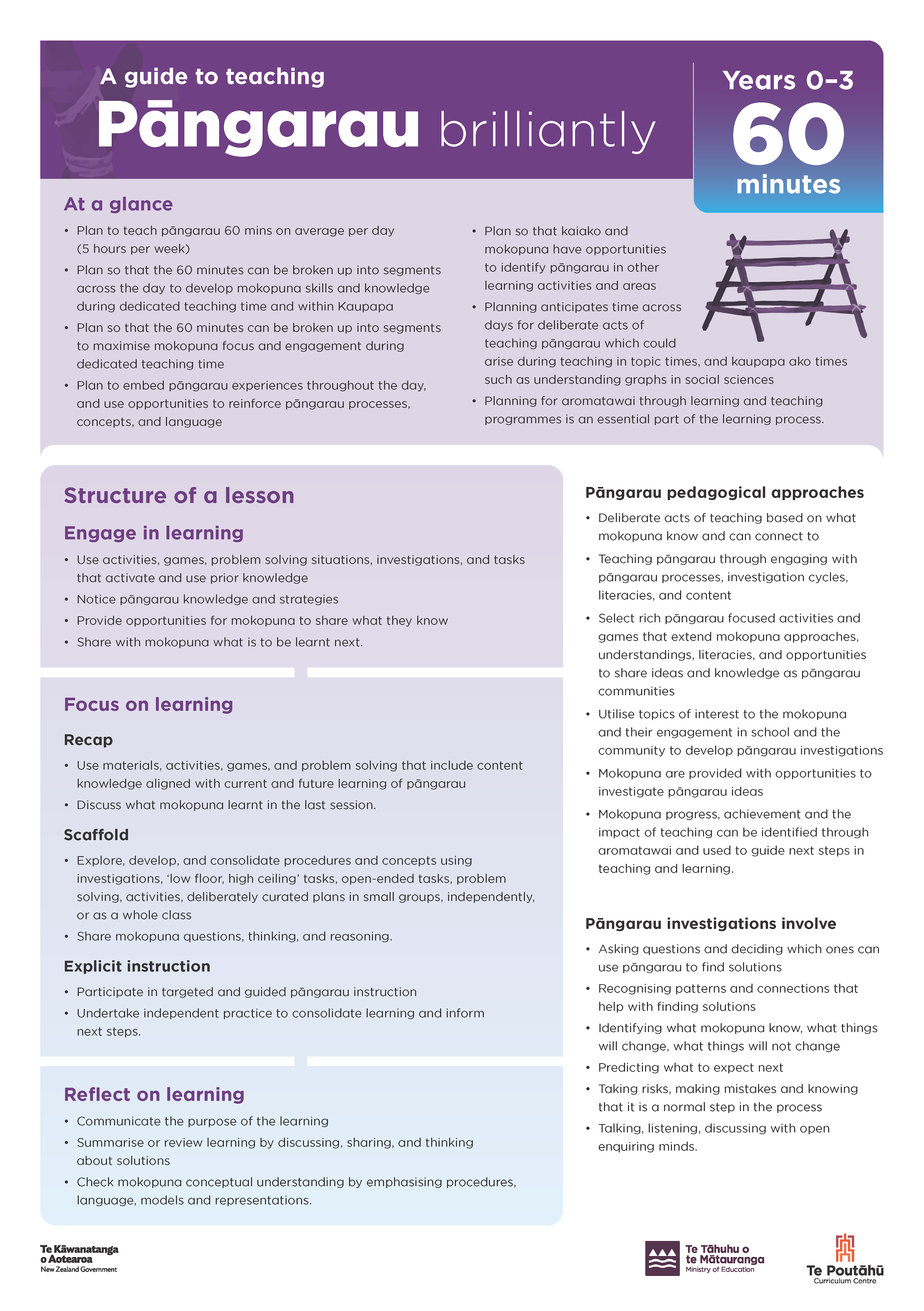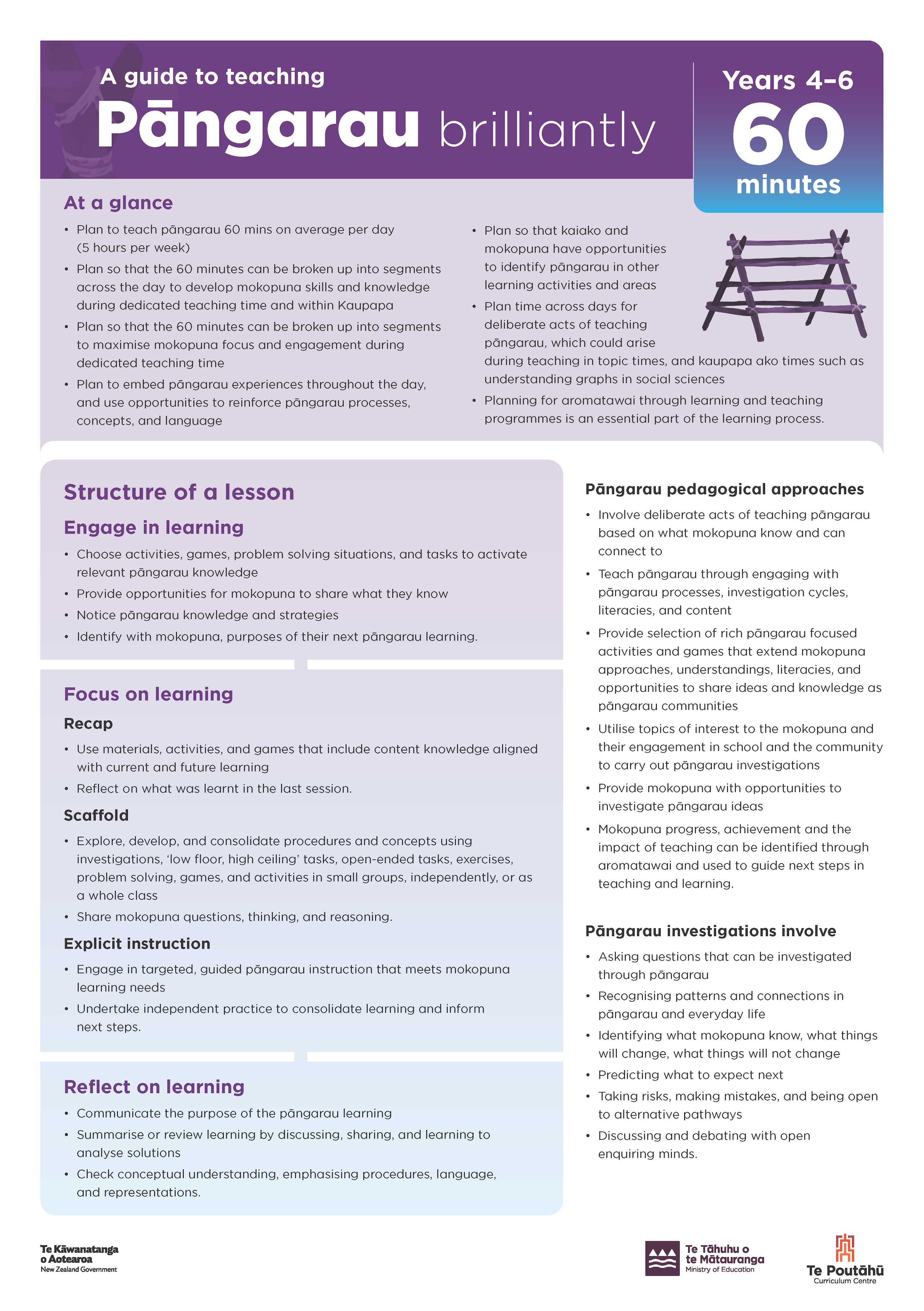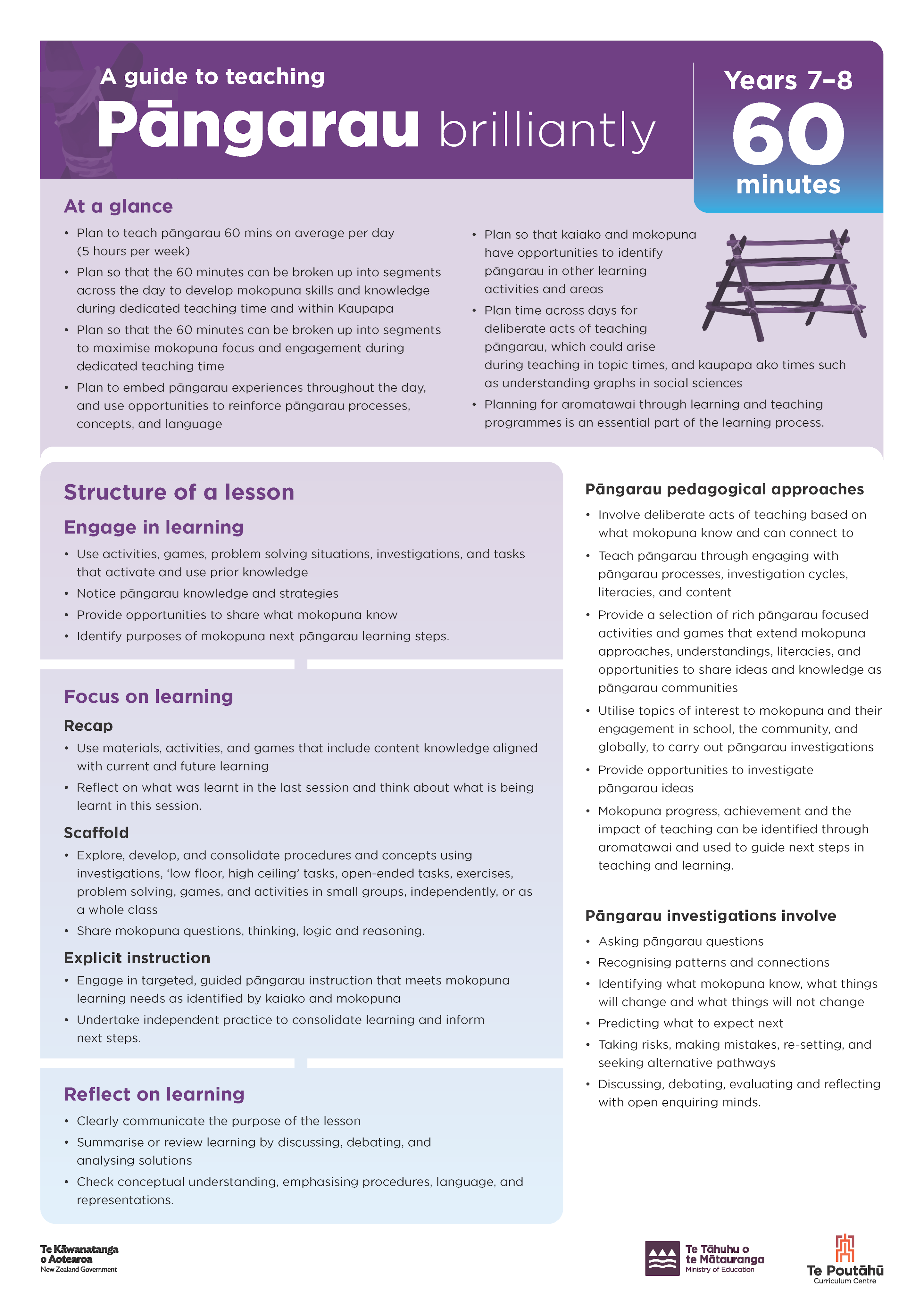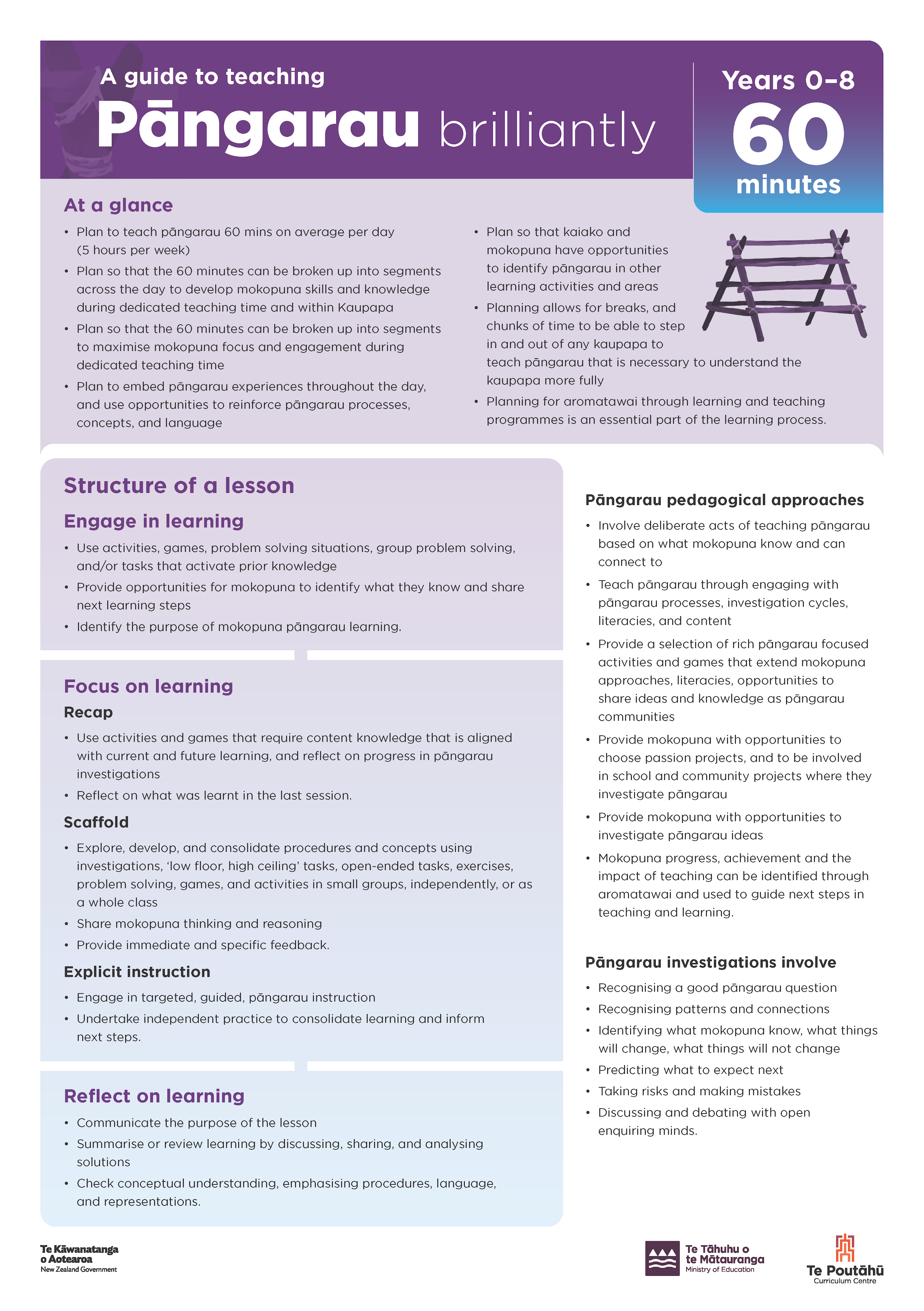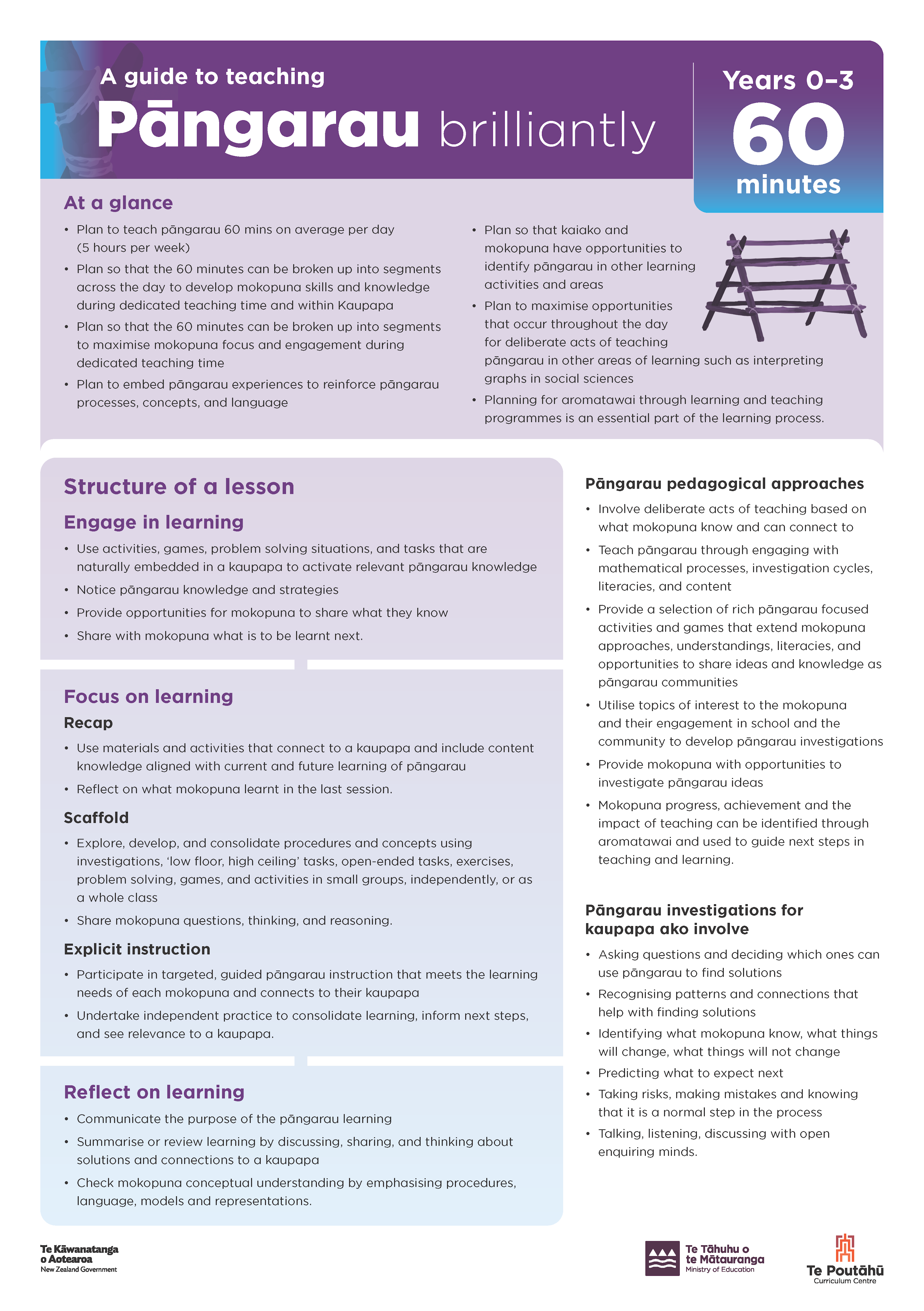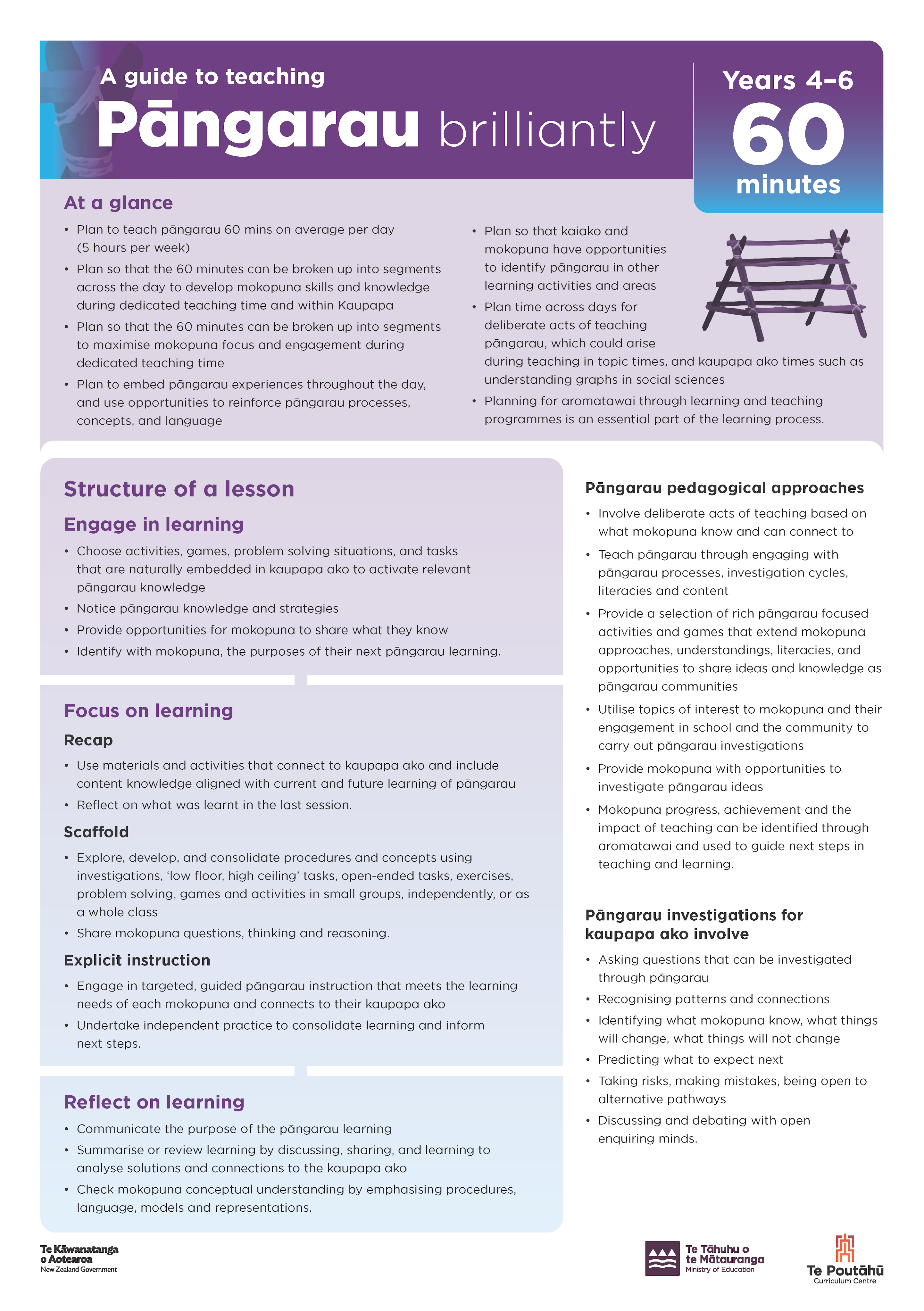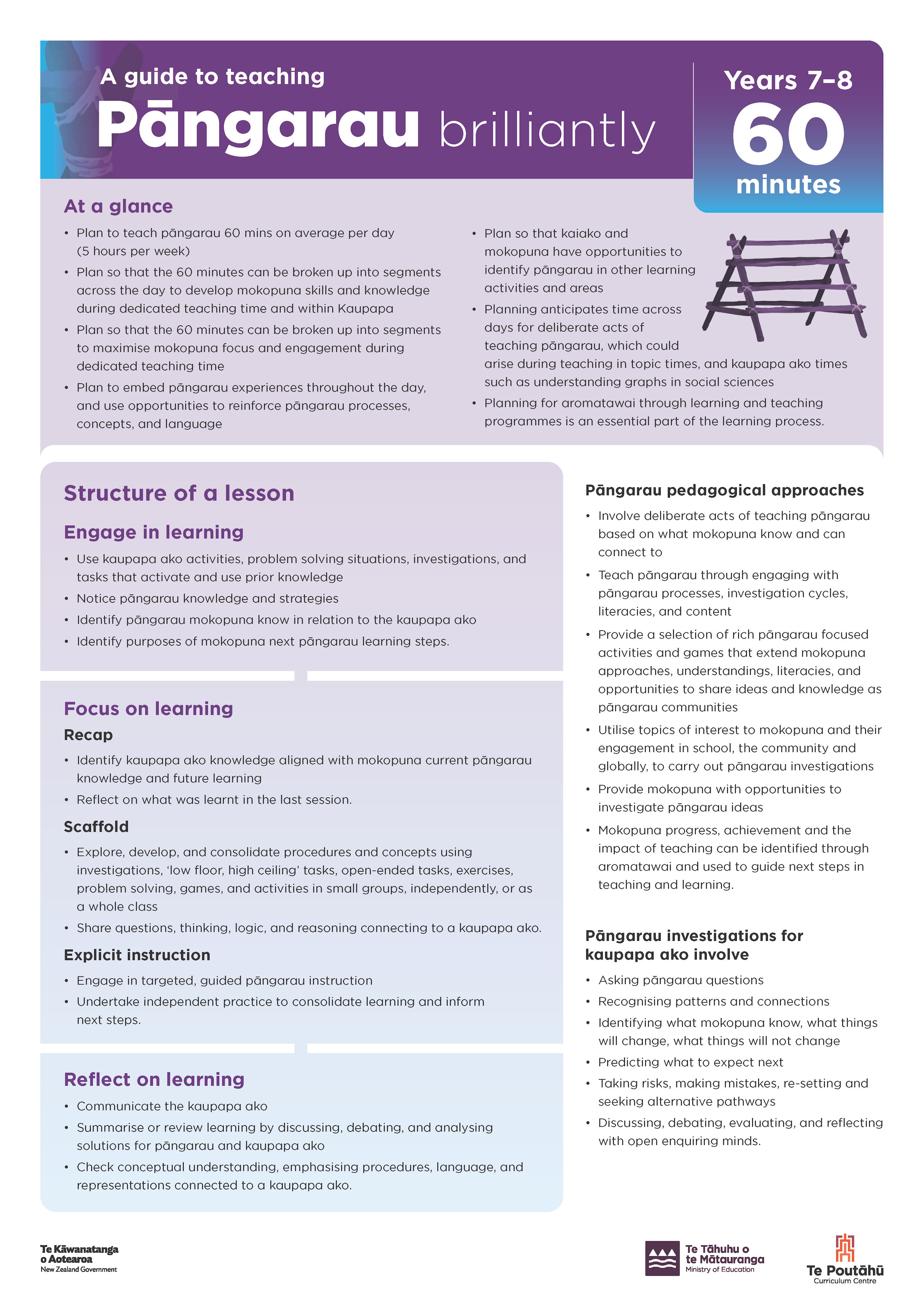Kia kotahi hāora te Pānui, Tuhituhi me te Pāngarau mō ngā ākonga Tau 0 – 8
Here we explain how the ‘hour a day’ policy for pānui, tuhituhi and pāngarau will be rolled out, and we share resources that will help kura prepare for this change.
- Pānui and Tuhituhi
- Pāngarau
Pānui and Tuhituhi
See the “About this resource” box below to download resources
Pānui
Tuhituhi
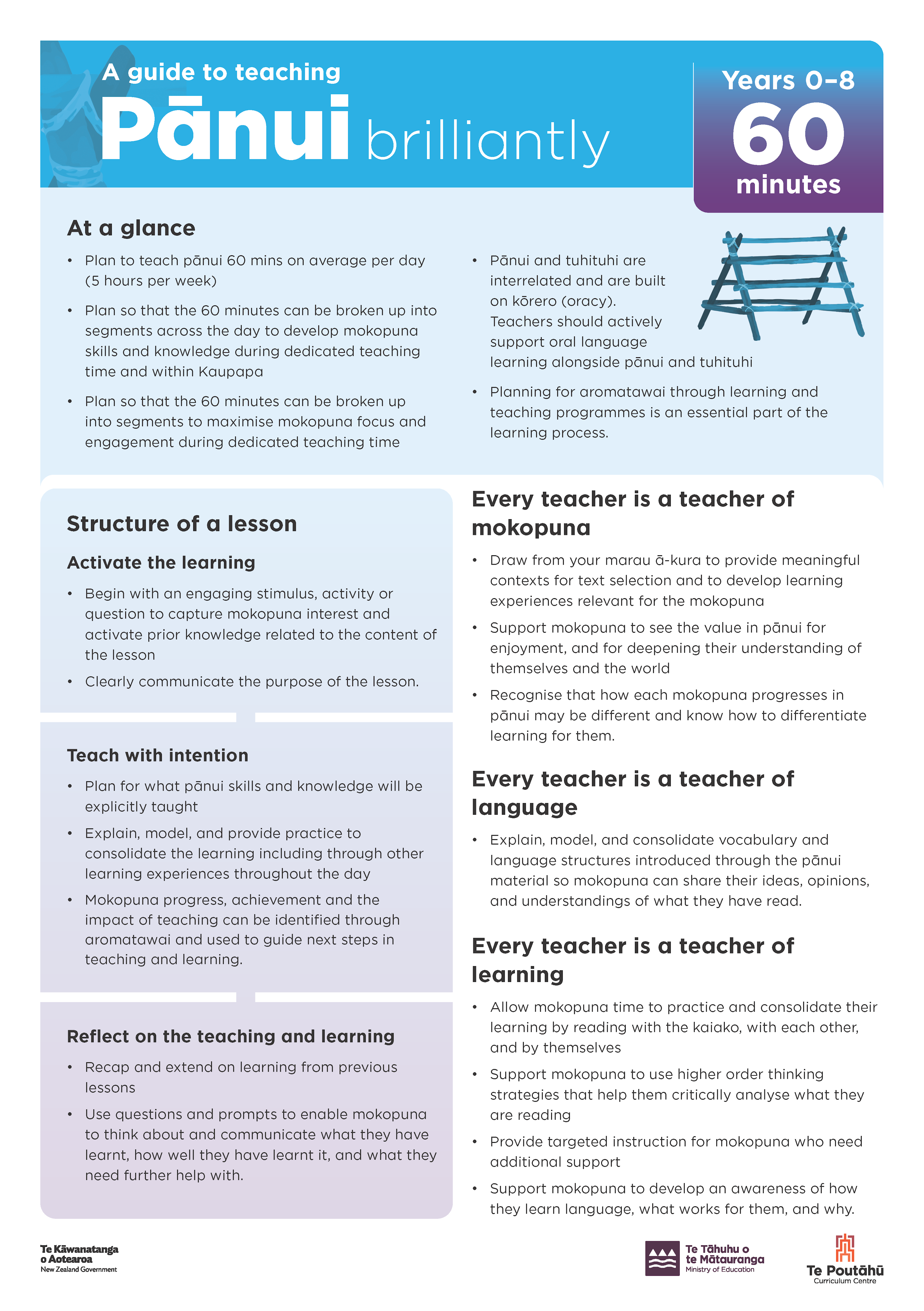
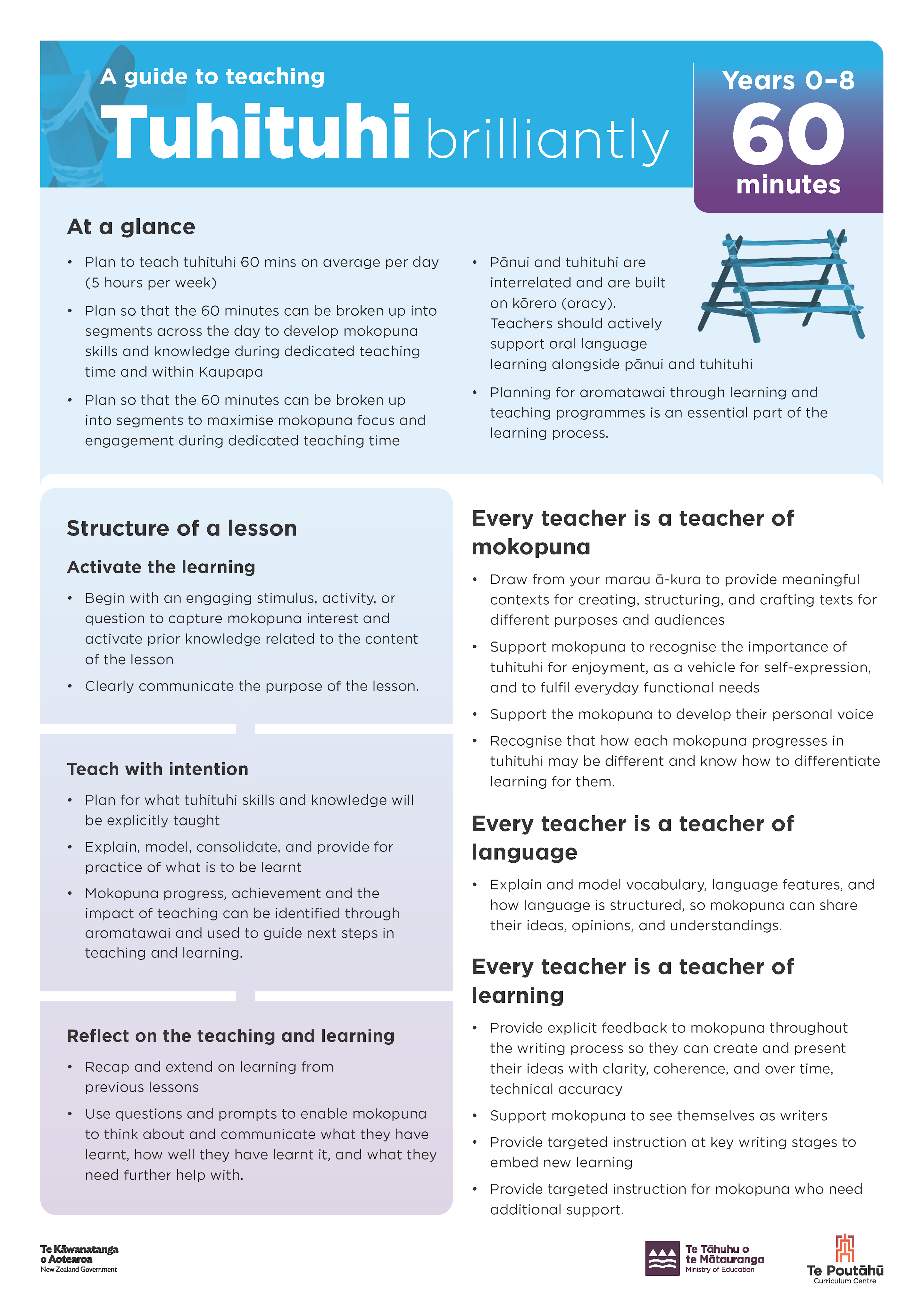
Ngā Kaupapa Ako
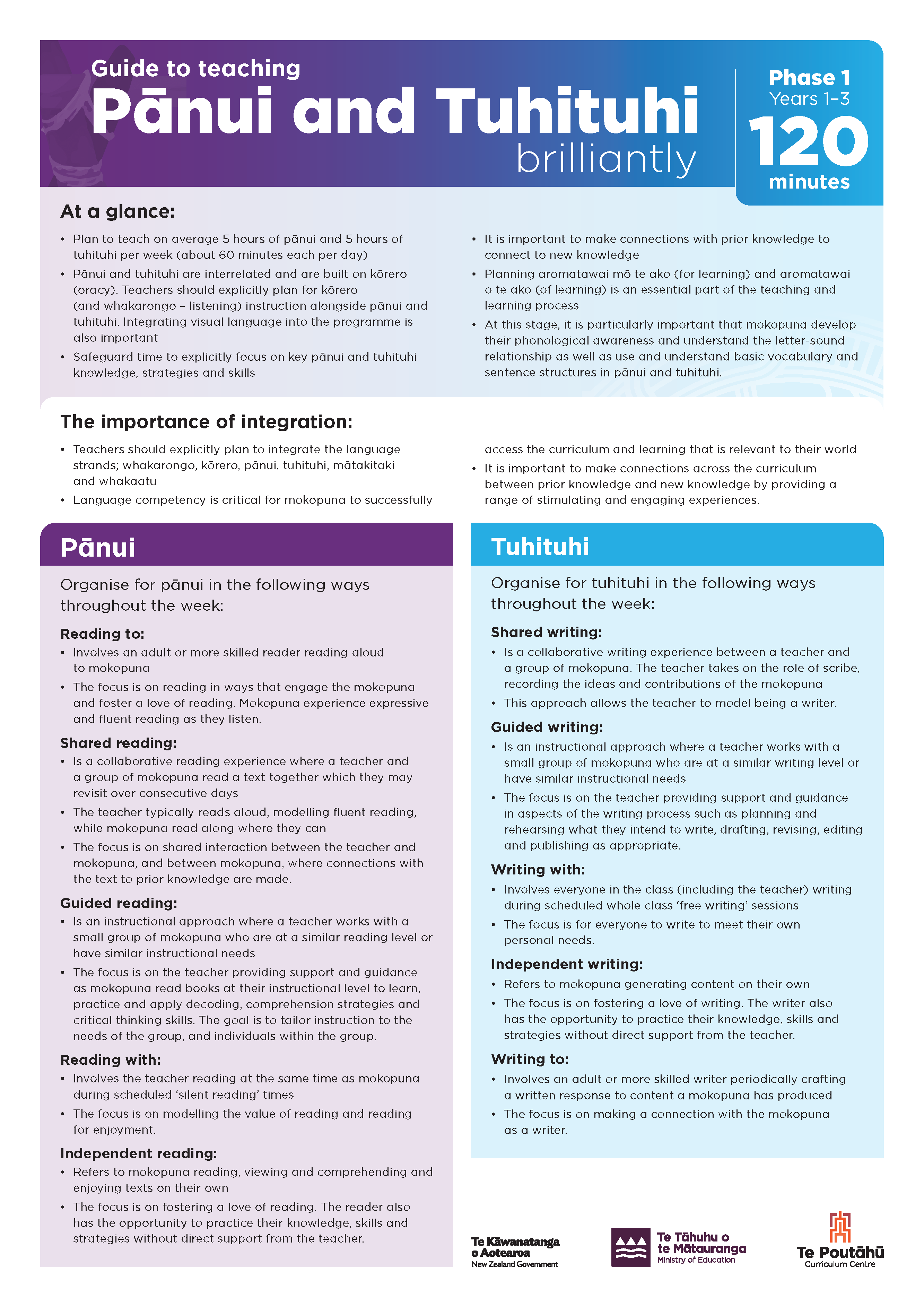
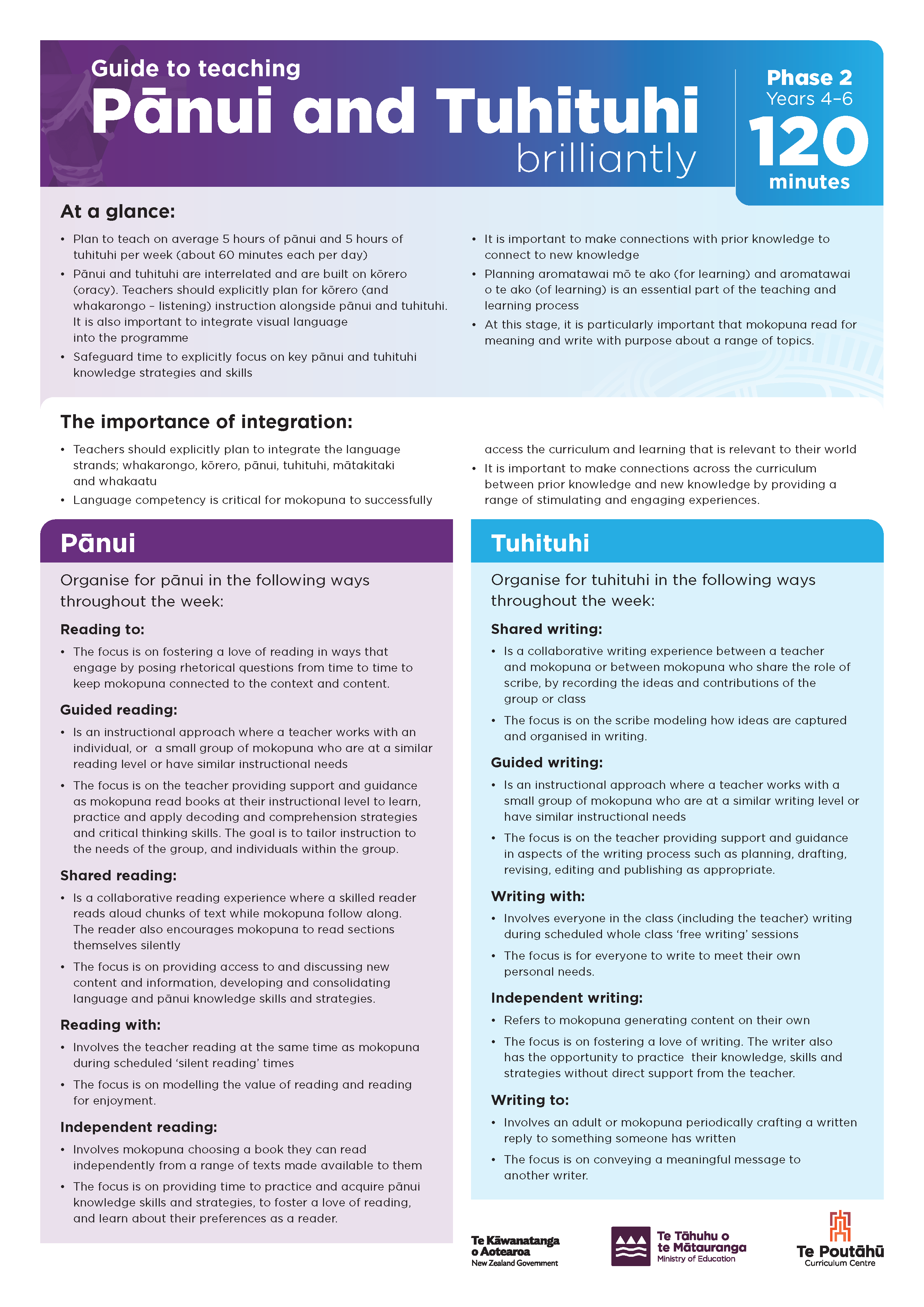
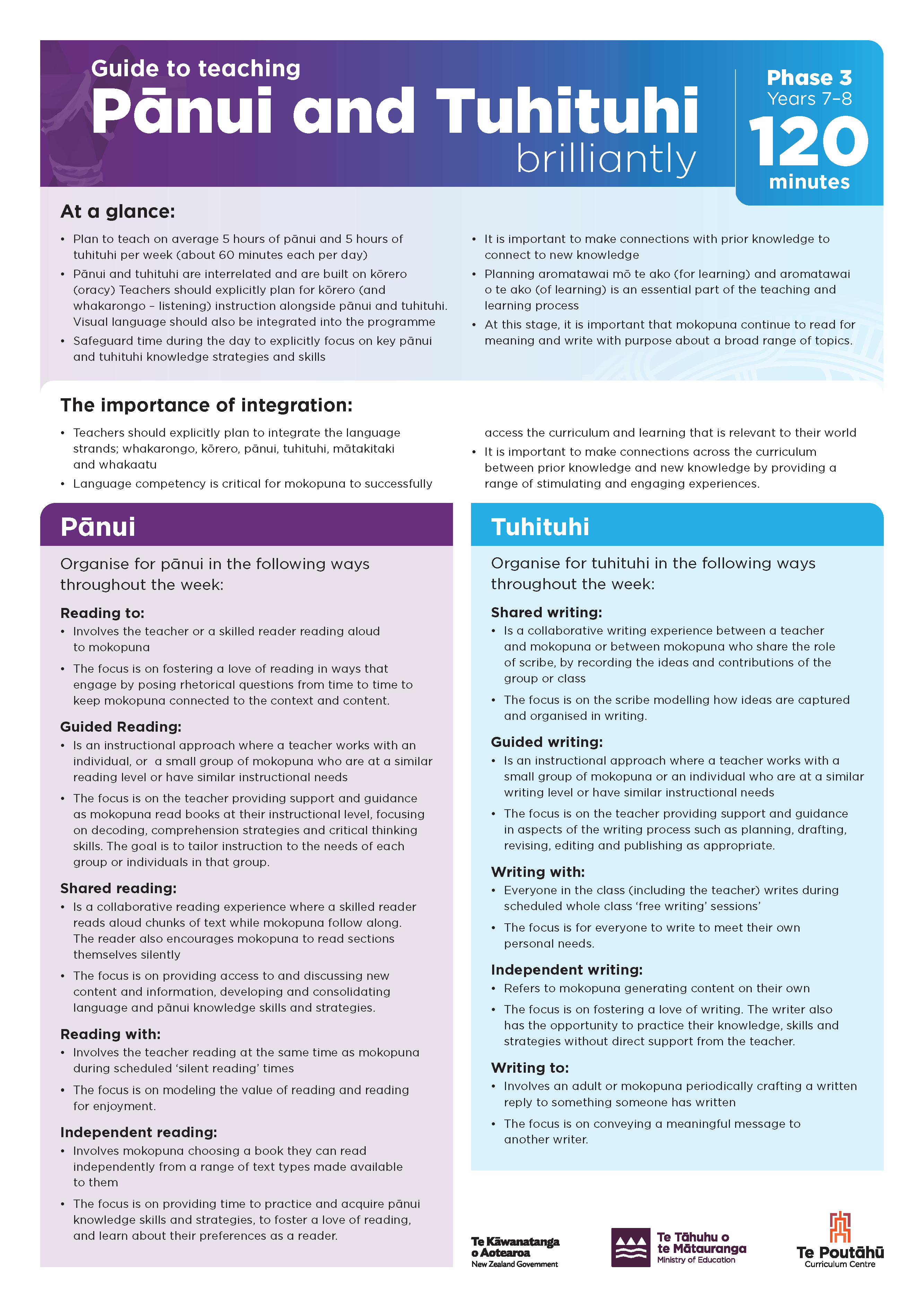
Kaupapa Māori kura run by a specified kura board are expected to begin implementation of this policy decision from 22 July 2024. This allows time for kura and the Ministry to discuss how it can be implemented in alignment with their philosophies.
Specified kura board means the board of any of the following:
- A Kura Kaupapa Māori
- A designated character kura with a character that is hapū – or iwi-based that affiliates with Ngā Kura ā Iwi o Aotearoa
- A state integrated kura with a special characher that is hapū – or iwi-based
From the beginning of Term 1 2024, schools with ākonga learning through te reo Māori in Years 0 – 8 in English medium will spend an average of an hour a day teaching pānui, tuhituhi and pāngarau. This could be in dedicated lessons, as well as through integration across all learning areas.
Tuhituhi, pānui and pāngarau are essential skills and are critical factors for successful progress, achievement and wellbeing of mokopuna across their educational journeys. Teachers will deliberately and purposefully dedicate time to teaching these core skills.
Most kura will already be doing this, so for many, there may not be a big change. However, it is the Government expectation that all Year 0 – 8 ākonga should receive regular, purposeful instruction in these core areas to help them progress with their learning.
Daily teaching has been shown to lift ākonga progress when coupled with a high-quality curriculum taught using evidence-informed teaching practices.
By guaranteeing sufficient time each day to participate in pānui, tuhituhi and pāngarau, inequities of access to learning are reduced.
We encourage kaiako to collaborate when planning teaching programmes to ensure ākonga are accessing up to an hour of pānui, tuhituhi and pāngarau each day and that the level is at the phase appropriate to their age, strengths and needs.
The guidance here supports conversations on how to use this time to continue providing quality learning experiences for ākonga.
Our Curriculum Lead service, Education Advisors and other specialist staff in regional offices are also available to help.
You can read the National Curriculum Statements (for the time requirements) and the Foundation Curriculum Policy Statement (for implementation detail) on Te Marautanga o Aotearoa by going to the ‘Mō te rauemi’ section.
Frequently asked questions
- Implementing the one hour a day change
- Monitoring and reporting obligations
- Integrating the policy into the curriculum
- More about maths teaching
- Aspects of literacy and communication teaching
Many schools will already be doing this amount of teaching, but from 1 January 2024 all schools and kura in New Zealand will implement one hour a day on average for each of reading, writing and maths | pānui, tuhituhi and pāngarau for students in Year 0 to 8.
Specialist schools with students in Years 0 – 8 will introduce this policy as soon as practicable, but have been given an extended, Term 1 2025 deadline. This additional time recognises these schools may have additional complexities to work through relating to timetabling and resourcing.
Kura with students in Years 0 – 8 run by a specified kura board have also been given a Term 3 2024 implementation date. This allows time for kura and the Ministry to discuss the policy and how it can be implemented in ways suitable to these settings.
All students need regular, deliberate teaching in literacy and maths. Teachers will continue to plan for individual needs as they design learning that recognises and responds to the next learning steps and approaches that are appropriate for the learner. In some cases, planning will be supported though individual learning plans, and these may include parent and specialist input.
Specialist schools are expected to deliberately plan for and seek teachable moments across each day that allow students access to each of reading, writing and maths | pānui, tuhituhi and pāngarau for at least an hour. These learning experiences should occur in authentic, meaningful situations that meets the complex health, sensory and learning needs of the students.
Specialist schools with students in Years 0 – 8 will introduce this policy as soon as practicable, but have been given an extended, Term 1 2025 deadline. This additional time recognises these schools may have additional complexities to work through relating to timetabling and resourcing.
Many area schools, composite schools, and schools with wharekura have a set timetable where students engage in a particular learning area at specific times with a teacher dedicated to that learning area.
While English and mathematics and statistics may be learning areas that naturally access reading, writing and maths respectively, other learning areas also have literacy-rich and numeracy-rich opportunities.
We encourage teachers to collaborate when planning teaching programmes to ensure that students are accessing an hour of reading, writing and maths each day and that the level of reading, writing and maths is at the phase appropriate to learners’ age, strengths and needs. For example, it would be useful when teaching Social Sciences to purposefully consider when statistical skills are used and to make this clear to students.
This also applies to Te Reo Māori and Pāngarau, Tīrewa Ako that naturally access reading, writing and maths respectively, as other learning areas also have literacy-rich and numeracy-rich opportunities. For example, it would be useful when teaching Pūmanawa Tāngata or Te Ao Māori to demonstrate when the statistical skills of pāngarau or the literacy skills of tuhituhi and pānui can be used so that ākonga can understand how to use these essential skills in different contexts.
A suite of practical guidance and resources can be found on this webpage. This includes examples of how a school might timetable the hour a day for each of reading, writing and maths in a range of contexts.
Additional resources may be needed to reflect the needs of particular schools, such as specialist schools or kura. The Ministry will work together with these schools during 2024 to develop any required guidance and resources.
Existing supports, such as Curriculum Leads, Education Advisors and other specialist staff in regional offices will continue to be available.
We encourage school leaders to work closely with their teachers and:
- use the guidance and FAQs provided here to understand the changes and how good reading, writing and maths teaching can be structured,
- become familiar with the refreshed English and mathematics and statistics learning areas to support planning of teaching and learning, and
- explore and use effective evidence-informed teaching practices.
Teachers are encouraged to use this opportunity to consider how reading, writing and maths can be taught during a dedicated time and where these skills can be integrated across the curriculum. During dedicated times for reading, writing and maths, teachers will engage in a range of learning experiences, including collaborative tasks, investigations, problem solving and games that support the aim of the lesson.
When taught as an integrated part of the curriculum, reading, writing and maths will be deliberately and purposefully planned.
The teaching approach should be appropriate to learners’ age, strengths, and needs. This means that teaching may be split throughout the day, to ensure students engage in these skills in authentic and meaningful ways.
The hour a day for each of reading, writing and maths focuses on students in the class as a whole, rather than specific individuals. However, as is currently the case, teachers will adapt their practice to suit individual students’ needs. Some will benefit from additional support and time, which may include more targeted or tailored small group or individual support where appropriate.
Special events are enriching for students and intent of the ‘one hour a day’ policy is not to detract or limit these events. The policy allows schools to manage the average amount of reading, writing and maths teaching time through a week. This provides the flexibility required to accommodate days where students may spend time out of the classroom.
We encourage schools and kura to continue using their usual communications methods to help the community to understand how the hour a day for each of reading, writing and maths works in your school, and for different year groups.
Information for parents and whānau can be accessed at One hour a day information for whānau.
Rumaki and reo rua schools are already using either Te Marautanga o Aotearoa or The New Zealand Curriculum as the primary guide for their teaching and learning programmes. Settings that have selected Te Marautanga o Aotearoa will be required to teach on average an hour a day each of pānui, tuhituhi, and pāngarau. Settings that have selected The New Zealand Curriculum will be required to teach on average an hour a day each of reading, writing, and maths.
About this resource
Learn more about the hour a day for each of pānui, tuhituhi and pāngarau for schools with Te Marautanga o Aotearoa
